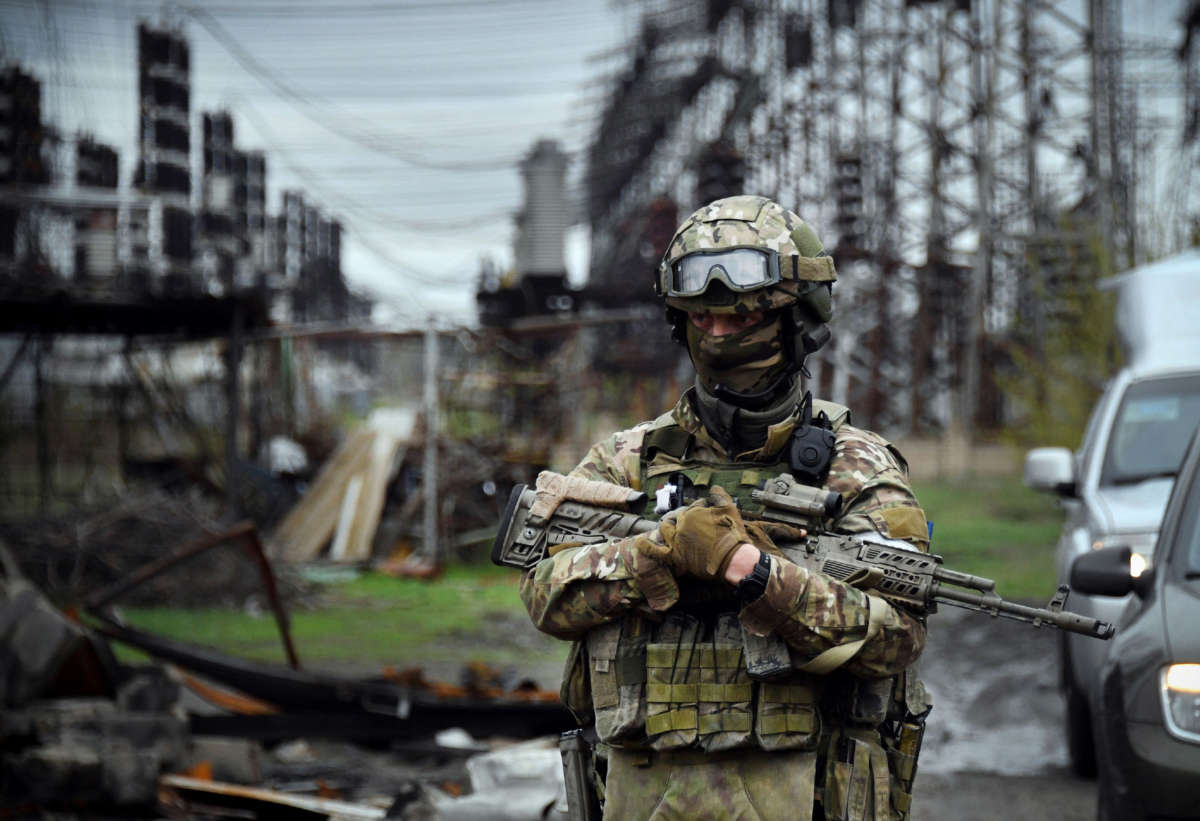Part of the Series
Russia's War on Ukraine in an Age of Escalating Imperial Tensions
Russian forces fighting for control of eastern Ukraine are believed to be preparing for an “operational pause” after taking control of Luhansk, one of two provinces in the Donbas region that Russian President Vladimir Putin claims to be “liberating” through a devastating war of attrition that has left entire cities in ruin.
Putin claimed a victory for Russia on Monday and gave awards to military brass for seizing the town of Lysychansk on the western border of the Luhansk Oblast. However, former Russian military commander Igor Girkin questioned the significance of the seizing the city in a “scathing” critique of Russia’s performance in the war, according to an analysis from the Institute for the Study of War (ISW), a U.S.-based non-partisan policy research organization.
Girkin, a hardline Russian nationalist who commanded militants during the 2014 war in the contested Donbas, suggested in a blog post that Russian forces have paid too high price for limited gains in Luhansk after weeks of grinding artillery battles and urban combat with U.S.-backed Ukrainian defenders, who are determined to weaken the Russian military and blunt the scope of Putin’s invasion.
A manpower shortage that has left beleaguered Russian soldiers at the front without replacements is badly damaging Russian morale, Girkin wrote. Putin publicly called on his troops around Lysychansk to rest and regroup, which is likely meant to signal concern for troops “in the face of periodic complaints in Russia” about the treatment of the soldiers, according to the ISW. Putin has so far avoided a mass mobilization of military conscripts at home, leaving independent critics such as Girkin frustrated by military failures and the Kremlin’s unwillingness to call up reserves and wage a wider war on Ukraine.
It’s unclear how long the “operational pause” in the invasion would last, but ISW analysts and other experts expect Putin’s forces to continue pushing into the neighboring Donetsk Oblast with punishing artillery assaults. Taking time to replenish offensive capability runs the risk of losing ground to Ukrainian counterattacks, Girkin warned.
Russian troops are reportedly working to establish administrative control of captured territory around Severodonetsk and Lysychansk, two cities on either side of the Donets river that suffered bloody street battles and constant artillery barrages. Russian forces could be preparing to forcibly conscript Ukrainian citizens still living there to fight on the side of Russian and its separatist allies, the ISW reports.
After months of indiscriminate shelling by Russian forces and Ukrainian counterattacks, Ukrainian Prime Minister Denys Shmyhal said on Monday that it will cost $750 billion to rebuild towns, cities and civilian infrastructure damaged by the war. International leaders grappled with a plan to rebuild Ukraine at a summit in Switzerland, with European nations and other Western allies pledging ongoing support.
Beyond Lysychansk, limited Russian ground assaults are resulting in incremental territorial gains as Putin’s army seeks out strategic positions before pushing the invasion further west. Sporadic rocket strikes have terrorized civilian areas in recent weeks.
Meanwhile, Ukrainian forces are now using HIMARS missile systems imported from the United States to strike Russian ammunition depots up to 75 kilometers behind the front lines, a sign of improved military capability after months of facing off with invaders who have superior weapons.
An apparent sabotage campaign targeting Russian-controlled railways continues in occupied Ukraine as well as inside Russia, where partisans and antiwar activists are working to disrupt the Russian army’s supply lines.
The Ukrainian Resistance Center reported that Ukrainian partisans blew up a railway bridge between Melitopol and Tokmak in occupied southeastern Ukraine on July 3, and derailed a separate armored train carrying ammunition near Melitopol a day earlier. Previous sabotage efforts were also successful, suggesting a coordinated resistance campaign in these occupied areas, according to ISW.
A self-described “cell” of anarchist militants took responsibility for railway sabotage near a Russian artillery depot in the Vladimir Oblast outside of Moscow. In posts on the social media platform Telegram, the militants claimed the sabotage temporarily stalled a train with military equipment and was meant to show “all the partizans [sic] how accessible such targets for sabotage are.”
Join us in defending the truth before it’s too late
The future of independent journalism is uncertain, and the consequences of losing it are too grave to ignore. To ensure Truthout remains safe, strong, and free, we need to raise $47,000 in the next 8 days. Every dollar raised goes directly toward the costs of producing news you can trust.
Please give what you can — because by supporting us with a tax-deductible donation, you’re not just preserving a source of news, you’re helping to safeguard what’s left of our democracy.
